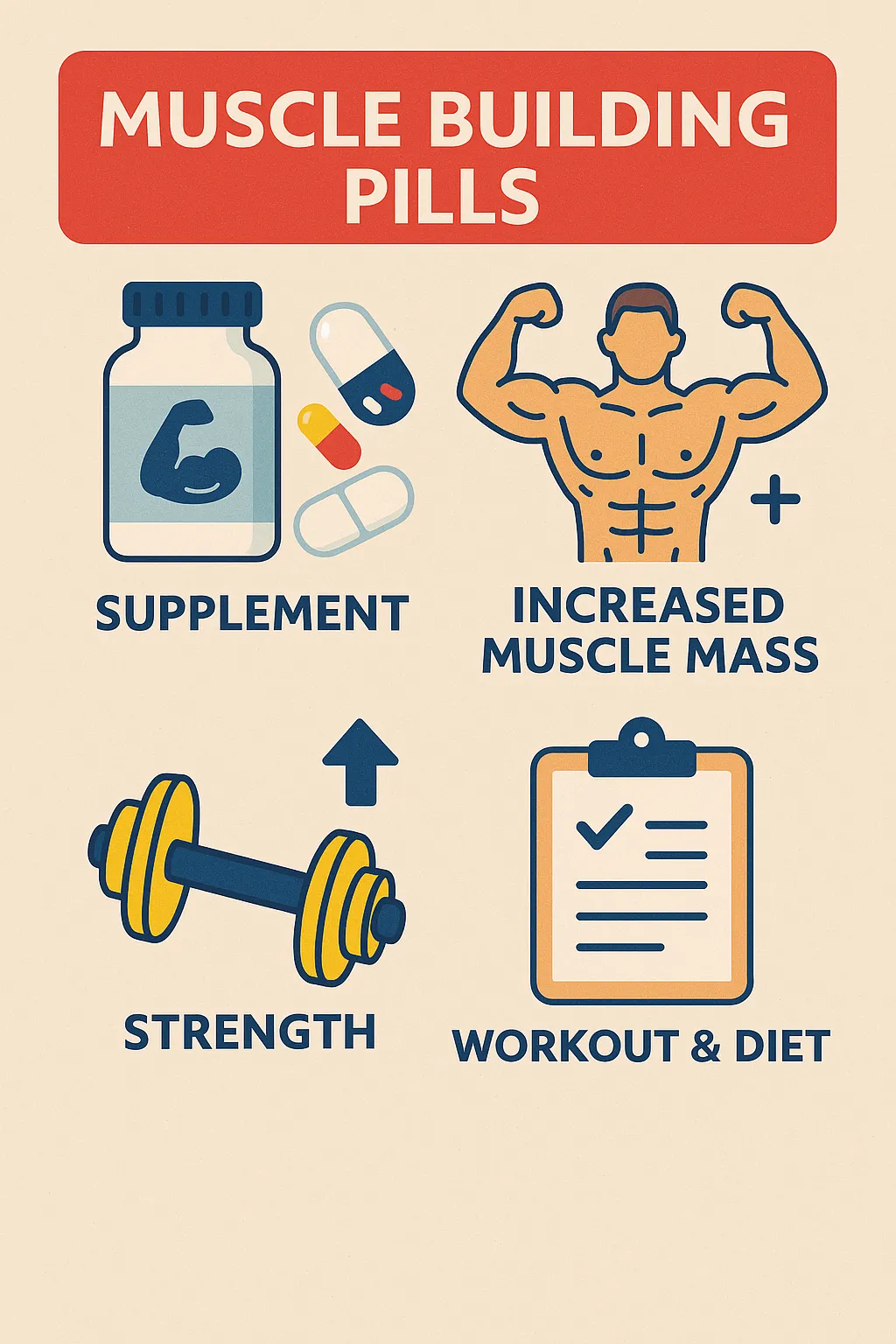Muscle growth, also known as hypertrophy, occurs when the weight of a muscle increases while the number of fibres remains constant. Depending on your physical needs and goals, you may want to consider taking specific supplements to help in muscle growth.

Best Muscle Building Pills Now
Some supplements promise to improve exercise, strength, muscular development, and general athletic performance. People may use these supplements to improve their workout regimen and recovery, gain strength, or reduce their risk of injury.
Creatine, whey protein, and glutamine are three popular muscle-building supplements. Here are the top 10 muscle building pills below:
1. Creatine
Creatine is an amino acid required for a variety of cellular processes throughout the body. It is one of the most extensively researched and commonly utilised supplements for enhancing exercise and physical performance. Creatine, according to science, helps muscles get the energy they need to accomplish physical activity at the molecular level.
Creatine has been demonstrated in studies to increase strength, power, and the number of sets performed during exercise. Many studies on creatine have been conducted on young people who are healthy. More research is needed to determine the benefits of creatine for the elderly and other groups of people.
Your liver, kidneys, and pancreas naturally produce creatine. Creatine can also be obtained from meals such as red meat and fish, as well as through nutritional supplements.
The typical creatine dosage is 20 grammes per day for 5-7 days, then 3-5 grammes per day for up to 12 weeks. Creatine supplementation has been linked to water retention-related weight gain, nausea, diarrhoea, muscle cramps, and heat intolerance. Staying hydrated can help reduce the likelihood of having these adverse effects.
2. Carnitine
Carnitine is a naturally occurring molecule in the brain, liver, and kidneys. Carnitine contributes to energy metabolism. According to research, it can boost oxygen intake and power output while exercising.
Consuming carnitine has also been shown in studies to aid post-workout recovery by mending damaged cells that produce muscular soreness. Several studies have also indicated that carnitine supplementation promotes muscular growth. More research is needed to better understand the effects of carnitine in muscle growth and repair.
Carnitine can be obtained by red meat, seafood, and some plants. You can also take it as a capsule, pill, or powder supplement. Doses range from 1-4 grams daily for up to one year. Carnitine’s most common side effects include stomach pains, nausea, diarrhoea, and a fishy odour.
3. Whey Protein
Whey is a protein present in milk that supplies the essential amino acids required for muscular development. Whey is digested faster than other protein products like soy or casein. It also frequently includes extra leucine, an amino acid that aids muscular growth.
Consistent whey protein ingestion combined with exercise may promote strength and muscular growth. Less frequent use or lower amounts of whey protein do not appear to improve athletic performance.
The finest food source of whey protein is dairy, specifically milk. Whey protein can also be consumed as supplements, such as powders, bars, and smoothies.
Whey protein doses of up to 30 grammes have been studied and shown to be safe for up to six months. Whey protein powders typically include 20-30 grammes of protein per scoop or serving. Whey may cause bloating, diarrhoea, thirst, and nausea.
If you have a milk allergy, avoid whey protein. The protein may also interact with levodopa, which is used to treat Parkinson’s disease.
4. Branched Chain Amino Acids (BCAAs)
Branched-chain amino acids (BCAAs) include leucine, isoleucine, and valine. BCAAs help skeletal muscle cells get energy during activity. Available research on BCAAs suggests that they may assist promote muscle development and strength while reducing damage and pain after exercise.
BCAAs can be found in beef, chicken, and dairy products, as well as in powder supplements. According to studies, 10-14 grammes per day may increase muscle size and strength. There have been no reported safety concerns with taking up to 20 grammes of BCAAs per day for up to six weeks.
Common negative effects of BCAAs include diarrhoea, nausea, and vomiting. BCAAs in high amounts may interact with the Parkinson’s disease treatment levodopa.
5. Glutamine
Glutamine is an amino acid produced by BCAAs and present in the muscles and bloodstream. Glutamine is an essential amino acid for metabolism and energy synthesis, and it is involved in a variety of biological activities. Glutamine may improve muscle strength, recuperation after exercise, and sports performance.
There is conflicting evidence about whether glutamine improves muscular performance and sports performance.
Glutamine supplements are commonly available in powder form. Glutamine was examined at doses of up to 45 grammes per day for six weeks. Bloating, constipation, headache, and musculoskeletal pain have all been recorded as side effects of glutamine.
6. Beta-hydroxy-beta-methylbutyrate (HMB)
Beta-hydroxy-beta-methylbutyrate (HMB) is a leucine metabolite required for cholesterol synthesis in the liver. It may hasten the recovery of damaged and strained skeletal muscle cells.
Some studies have also found that HMB improves power, strength, and performance in both trained and untrained people. Other trials have yielded inconsistent results, and it is unclear what influence HMB has on muscle growth and strength.
HMB comes in two forms: calcium-containing (HMB-Ca) and calcium-free (HMB-FA). If you want to minimise your calcium intake, choose the calcium-free option. HMB dose ranges from 1.5 to 6 grammes daily, with 3 grammes being the most typically reported amount.
Experts recommend taking HMB-Ca 60-120 minutes before exercise and HMB-FA 30-60 minutes before exercise for a minimum of two weeks. There have been no known safety concerns with doses of 3 grammes per day for up to 2 months, and no widely reported adverse effects.
7. Betaine
Betaine, or trimethylglycine, is a chemical present in sugar beetroot juice. Betaine’s role in muscle building is not fully understood. According to research, it raises creatine levels, which boosts energy for physical activity.
Many studies show that betaine improves strength and power-based performance, particularly in bodybuilders and cyclists. However, some research indicates that betaine is not particularly effective for muscle growth and strength.
Betaine can be found in spinach, beets, and whole-grain bread, as well as in capsules or powder supplements. The usual amount of betaine obtained by diet ranges from 100 to 300 milligrammes daily. The effective dose range for betaine supplementation is 2-5 grammes per day for up to 15 days. There have been no known negative effects with betaine.
8. Coenzyme Q10
Coenzyme Q10 (CoQ10) is a natural compound present in the heart, liver, kidneys, and pancreas. Some research suggests that CoQ10 possesses antioxidant and anti-inflammatory effects that may help reduce exercise-induced muscle injury. More research is required to confirm this hypothesis.
Typical CoQ10 doses vary from 60 to 1,000 milligrammes per day for up to 12 weeks. Insomnia and stomach distress were among the reported side effects. CoQ10 may interact with some medications, such as the blood thinner warfarin, insulin, and several cancer treatments.
9. Dehydroepiandrosterone (DHEA)
Dehydroepiandrosterone (DHEA) is a steroid hormone that is transformed into testosterone or oestradiol in the body. Some studies suggest that DHEA may improve athletic performance and muscle growth. Other studies, however, have found no evidence that consuming DHEA improves strength or body composition.
DHEA supplements are available in capsule and powder forms. DHEA is deemed safe at doses of up to 150 milligrammes per day for 6-12 weeks. DHEA side effects include headaches, sleeplessness, mood changes, and nausea. Women who take DHEA may experience higher testosterone levels over time, resulting in adverse effects such as acne or facial hair.
DHEA is prohibited by several organisations, including the National Collegiate Athletic Association (NCAA) and the International Olympic Committee (IOC).
10. Beta Alanine
Beta-alanine is an amino acid that helps the muscles produce carnosine. Carnosine is a dipeptide that modulates muscle pH, reducing muscular fatigue and improving exercise performance.
Beta-alanine’s effects on muscle growth and exercise performance have yielded conflicting results. The results are also inconsistent depending on the sort of exercise performed and how long it lasts. More research is needed to determine the benefits of beta-alanine.
Experts recommend consuming 4-6 grammes of beta-alanine each day, divided into two-gram dosages or fewer. If taken continuously, carnosine levels in the muscle should increase by 40-60% after four weeks and by 80% after ten weeks.
Beta-alanine is available in pill or powder form and is regarded safe at doses ranging from 1.6 to 6.4 grammes per day for up to eight weeks.19 Itchy skin is a typical adverse effect associated with beta-alanine. Tingling in the face, hands, neck, and upper torso has been recorded at doses of 800 milligrammes or more.
How to Choose Supplements
Supplements for muscle growth come in a variety of forms, including bars, capsules, liquids, powders, and pills. When shopping for supplements, it is critical to consider the product’s quality.
The United States Food and Drug Administration (FDA) does not examine or approve supplement ingredients, labelling, quality, or safety prior to sale.
Choosing supplements that have been evaluated by independent third-party organisations ensures that the substances listed are genuinely present in the supplement. Credible testing organisations include the United States Pharmacopoeia (USP), NSF International, and ConsumerLab.com.
Muscle and athletic performance supplements are frequently sold as bundles of various pills. Consult your doctor before beginning a muscle-building supplement. They can advise you on which supplements are most appropriate for your needs and medical history.
A Quick Review
Muscle growth occurs when the weight of a muscle increases while the number of fibres present remains constant. You could be interested in consuming muscle-building supplements like creatine, whey protein, and glutamine. If you want to learn more about muscle growth supplements, talk to your healthcare physician.







